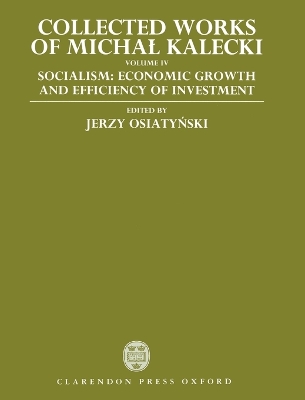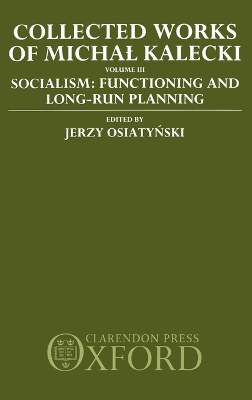Collected Works of Michal Kalecki
7 total works
Collected Works of Michal Kalecki: Volume I. Capitalism: Business Cycles and Full Employment
by Michal Kalecki
Published 4 October 1990
This is the first volume in a new, definitive, seven-volume edition of the works of Michal Kalecki, one of the twentieth century's most distinguished economists. Kalecki was one of the three contemporary economists to arrive at the conclusions publicized by Keynes, although Kalecki arguably presented these views even earlier than Keynes.
Volume I contains Kalecki's writings on the theory of the business cycle and full employment. His seminal Essay on the Business Cycle Theory is preceded by his earlier theoretical studies and followed by publications which developed and defended its main concepts and ideas. This volume also contains the 1939 book Essays in the Theory of Economic Fluctuations, the work which established his reputation. Also included are papers documenting his confrontation with Keynes's General Theory, including Kalecki's review of that work, and his various studies on the theory and policies relating to full employment, both the well known `Political Aspects of Full Employment' and `Three Ways to Full Employment', and those which have unfairly received less attention.
The editorial comments and annexes at the end of the volume, besides giving valuable information on the background to the main texts, include illuminating exchanges of correspondence between Kalecki and Keynes, Joan Robinson, and others.
Volume I contains Kalecki's writings on the theory of the business cycle and full employment. His seminal Essay on the Business Cycle Theory is preceded by his earlier theoretical studies and followed by publications which developed and defended its main concepts and ideas. This volume also contains the 1939 book Essays in the Theory of Economic Fluctuations, the work which established his reputation. Also included are papers documenting his confrontation with Keynes's General Theory, including Kalecki's review of that work, and his various studies on the theory and policies relating to full employment, both the well known `Political Aspects of Full Employment' and `Three Ways to Full Employment', and those which have unfairly received less attention.
The editorial comments and annexes at the end of the volume, besides giving valuable information on the background to the main texts, include illuminating exchanges of correspondence between Kalecki and Keynes, Joan Robinson, and others.
Collected Works of Michal Kalecki: Volume VI: Studies in Applied Economics 1927-1941
by Michal Kalecki
Published 17 October 1996
The sixth volume of the Collected Works of Michał Kalecki, one of the twentieth-century's pre-eminent economists, contains his empirical studies of the capitalist economy, published primarily in pre-war Poland.
The first part of the book collects together reviews of business conditions in commodity markets, studies of the structure and operations of large companies and cartels, and articles on international economic relations. These studies, written between 1928 and 1935, demonstrate Kalecki's keen insight into the international consequences of the Great Crisis of 1929-33, and into the developments in Nazi Germany. The second part contains Kalecki's papers on the methodological problems of examining business fluctuations and on constructing indicators of economic trends. Part 3 comprises, Kalecki's estimates (together with Ludwik Landau) of the national income in Poland and of its structure. These studies, conducted between 1931 and 1935, were unique at the time in taking into account the distribution of aggregate income between the main social classes.
The editorial notes and annexes at the end of the volume not only provide invaluable background information and explanatory glosses on the main text, but also give invaluable insights into the development of Kalecki's thought.
The first part of the book collects together reviews of business conditions in commodity markets, studies of the structure and operations of large companies and cartels, and articles on international economic relations. These studies, written between 1928 and 1935, demonstrate Kalecki's keen insight into the international consequences of the Great Crisis of 1929-33, and into the developments in Nazi Germany. The second part contains Kalecki's papers on the methodological problems of examining business fluctuations and on constructing indicators of economic trends. Part 3 comprises, Kalecki's estimates (together with Ludwik Landau) of the national income in Poland and of its structure. These studies, conducted between 1931 and 1935, were unique at the time in taking into account the distribution of aggregate income between the main social classes.
The editorial notes and annexes at the end of the volume not only provide invaluable background information and explanatory glosses on the main text, but also give invaluable insights into the development of Kalecki's thought.
This volume contains Kalecki's writings on the theory of growth of a socialist economy and the theory of economic efficiency of investment. These are supplemented by essays on some economic and social problems of People's Poland.
Though quite theoretical in nature, both the Introduction to the Theory of Growth in a Socialist Economy and Kalecki's many studies in the theory of economic efficiency of investment projects are deeply rooted in his practical experience as an economic planner. It is only in this light that the significance of his contributions to the theory of economic efficiency of investments can be assessed, and his ideas on socialist reproduction can be seen as a whole. Its central point is economic planning, which for Kalecki was the fundamental feature of a socialist economy.
Though quite theoretical in nature, both the Introduction to the Theory of Growth in a Socialist Economy and Kalecki's many studies in the theory of economic efficiency of investment projects are deeply rooted in his practical experience as an economic planner. It is only in this light that the significance of his contributions to the theory of economic efficiency of investments can be assessed, and his ideas on socialist reproduction can be seen as a whole. Its central point is economic planning, which for Kalecki was the fundamental feature of a socialist economy.
Collected Works of Michal Kalecki: Volume II. Capitalism: Economic Dynamics
by Michal Kalecki
Published 20 June 1991
The seven volumes will comprise the definitive scholarly edition of the works of Michał Kalecki, one of the most distinguished of twentieth-century economists and one of the trio who arrived at the conclusions promulgated by Keynes around the same time as - and in Kalecki's case, arguably earlier than - Keynes himself.
Nearly half the material to appear in the seven volumes has never been previously published in English and includes revisions and additions made in the light of recent research, including information about the relationship of Kalecki's ideas to the ideas of contemporary economic theory.
This volume deals with the capitalist economy and contains Kalecki's studies on the theory of income distribution in oligopolistic capitalism and on its economic dynamics.
Each part of the book consists of essays devoted to a similar topic and individual papers in each part are arranged in chronological order. The editorial comments and annexes at the end of the volume, besides giving valuable information on the background to the main texts, include illuminating exchanges of correspondence between Kalecki and Keynes, Joan Robinson, and others.
Nearly half the material to appear in the seven volumes has never been previously published in English and includes revisions and additions made in the light of recent research, including information about the relationship of Kalecki's ideas to the ideas of contemporary economic theory.
This volume deals with the capitalist economy and contains Kalecki's studies on the theory of income distribution in oligopolistic capitalism and on its economic dynamics.
Each part of the book consists of essays devoted to a similar topic and individual papers in each part are arranged in chronological order. The editorial comments and annexes at the end of the volume, besides giving valuable information on the background to the main texts, include illuminating exchanges of correspondence between Kalecki and Keynes, Joan Robinson, and others.
Collected Works of Michal Kalecki: Volume III. Socialism: Functioning and Long-Run Planning
by Michal Kalecki
Published 21 January 1993
This is the third of seven volumes comprising the definitive scholarly edition of the works of Michał Kalecki, one of the most distinguished twentieth-century economists and one of the trio who arrived at the conclusions promulgated by Keynes around the time - and in Kalecki's case arguably earlier - than Keynes himself.
Nearly half the material to appear in the seven volumes has never been previously published in English and includes revisions and additions made in the light of recent research, including information about the relationship of Kalecki's ideas to the ideas of contemporary economic theory.
This third volume contains Kalecki's studies on the functioning of the socialist economy and on long-run planning, with special reference to Poland. Kalecki made an extensive contribution to the debates on Poland's post-war reconstruction, and especially on the system of planning and management of the Polish economy in 1955-64 and much of his work was unpublished until the 1980's. His activities throughout this period were so varied - on the practical level as well as on the theoretical - that the volume contains nearly all the material which has survived - Kalecki's correspondence, notes, records of his contribution to debates, and memoranda, providing an opportunity to survey Kalecki's activities related to the functioning of the Polish post-war economy.
Nearly half the material to appear in the seven volumes has never been previously published in English and includes revisions and additions made in the light of recent research, including information about the relationship of Kalecki's ideas to the ideas of contemporary economic theory.
This third volume contains Kalecki's studies on the functioning of the socialist economy and on long-run planning, with special reference to Poland. Kalecki made an extensive contribution to the debates on Poland's post-war reconstruction, and especially on the system of planning and management of the Polish economy in 1955-64 and much of his work was unpublished until the 1980's. His activities throughout this period were so varied - on the practical level as well as on the theoretical - that the volume contains nearly all the material which has survived - Kalecki's correspondence, notes, records of his contribution to debates, and memoranda, providing an opportunity to survey Kalecki's activities related to the functioning of the Polish post-war economy.
Collected Works of Michal Kalecki: Volume V: Developing Economies
by Michal Kalecki
Published 6 May 1993
This is the fifth of seven volumes comprising the definitive scholarly edition of the works of Michal Kalecki, one of the most distinguished 20th-century economists.
This volume contains Kalecki's studies on the theory and practice of economic development. Its first part is devoted to general problems of economic underdevelopment. `Observations on Social and Economic Aspects of "Intermediate Regimes"' is his best-known paper here, but the other two papers are equally important for the understanding of Kalecki's approach to problems of the underdeveloped non-socialist countries. In Part 2, `The Problem of Financing Economic Development', published in Mexico in 1953, attracted great interest and possibly gave rise to a new school of thought (that is, Structuralism) in development economics. Part 3 contains Kalecki's four empirical case studies on development problems of Israel, India, Cuba, and Bolivia.
As in the case of his work on the capitalist and the socialist economies, his studies on the economic development of underdeveloped countries are deeply rooted in their specific social and political conditions.
This volume contains Kalecki's studies on the theory and practice of economic development. Its first part is devoted to general problems of economic underdevelopment. `Observations on Social and Economic Aspects of "Intermediate Regimes"' is his best-known paper here, but the other two papers are equally important for the understanding of Kalecki's approach to problems of the underdeveloped non-socialist countries. In Part 2, `The Problem of Financing Economic Development', published in Mexico in 1953, attracted great interest and possibly gave rise to a new school of thought (that is, Structuralism) in development economics. Part 3 contains Kalecki's four empirical case studies on development problems of Israel, India, Cuba, and Bolivia.
As in the case of his work on the capitalist and the socialist economies, his studies on the economic development of underdeveloped countries are deeply rooted in their specific social and political conditions.
Collected Works of Michal Kalecki: Volume VII: Studies in Applied Economics 1940-1967; Miscellanea
by Michal Kalecki
Published 13 March 1997
The seventh volume of the Collected Works of Michal Kalecki, one of the twentieth century's preeminent economists, contains his empirical studies of the wartime and post-war economy in Britain and the USA, together with papers on the work of other economists and miscellanea.
The first part of the book collects together his articles on the economic conditions of Britain during the Second World War, focusing on the rationing of consumption and war finance, and its post-war reconstructions. These articles are among Kalecki's best known, and contributed significantly to his world renown as an economist. Part two contains studies of post-war America, comparing the economy with the situation before the War. Part three contains a group of articles under the title `Political economy and economists', and includes book reviews and essays on the study of economics. Part four collects essays on a variety of topics, including Polish economic planning, construction engineering, and the theory of numbers. As in previous volumes, editorial notes and annexes by Professor Osiatyński provide invaluable background information and explanatory glosses on the main text. Among other things, they reveal details of Kalecki's work for the United Nations.
Since this is the final volume of the Collected Works, it concludes with a chronology of biographical information and a complete bibliography of Kalecki's writings from 1927 to 1987.
The first part of the book collects together his articles on the economic conditions of Britain during the Second World War, focusing on the rationing of consumption and war finance, and its post-war reconstructions. These articles are among Kalecki's best known, and contributed significantly to his world renown as an economist. Part two contains studies of post-war America, comparing the economy with the situation before the War. Part three contains a group of articles under the title `Political economy and economists', and includes book reviews and essays on the study of economics. Part four collects essays on a variety of topics, including Polish economic planning, construction engineering, and the theory of numbers. As in previous volumes, editorial notes and annexes by Professor Osiatyński provide invaluable background information and explanatory glosses on the main text. Among other things, they reveal details of Kalecki's work for the United Nations.
Since this is the final volume of the Collected Works, it concludes with a chronology of biographical information and a complete bibliography of Kalecki's writings from 1927 to 1987.






